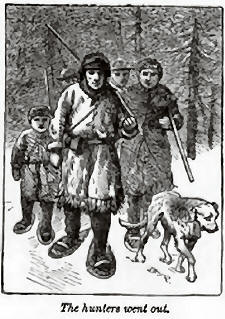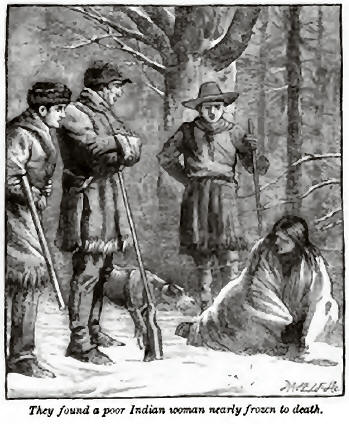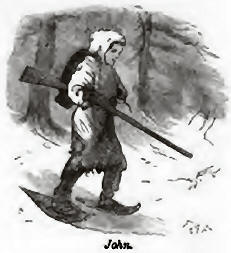Alfred and Martin brought in the wolf which Emma had
killed, but it was frozen so hard, that they could not skin it. Poor
little Trim was also carried in, but the ground was too hard frozen for
them to bury the body, so they put it into the snow until the spring,
when a thaw would take place. As for the wolf, they said nothing about
it, but they remained up when the rest of the family retired, and after
the wolf had been some time before the fire, they were able to take off
the skin.
 On
the following morning, when the hunters went out, they were particularly
desired to shoot a wild turkey if they could, as the next day was
Christmas-day.
On
the following morning, when the hunters went out, they were particularly
desired to shoot a wild turkey if they could, as the next day was
Christmas-day.
“Let us take Oscar with us,” said Alfred; “he is very swift, and may run
them down; we never can get up with them in our snow-shoes.”
“I
wonder whether they will get a turkey,” said Emma, after the hunting
party had left.
“I
think it will be difficult,” said Mrs Campbell; “but they will try all
they can.”
“I
hope they will; for Christmas-day without a turkey will be very
un-English.”
“We are not in England, my dear Emma,” said Mr Campbell; “and wild
turkeys are not to be ordered from the poulterer’s.”
“I
know that we are not in England, my dear uncle, and I feel it too. How
was the day before every Christmas-day spent at Wexton Hall! What piles
of warm blankets, what a quantity of duffel cloaks, flannels, and
worsted stockings were we all so busy and so happy in preparing and
sorting to give away on the following morning, that all within miles of
us should be warmly clothed on that day. And, then, the housekeeper’s
room with all the joints of meat, and flour and plums and suet, in
proportion to the number of each family, all laid out and ticketed ready
for distribution. And then the party invited to the servants’ hall, and
the great dinner, and the new clothing for the school-girls, and the
church so gay with their new dresses in the aisles, and the holly and
the mistletoe. I know we are not in England, my dear uncle, and that you
have lost one of your greatest pleasures—that of doing good, and making
all happy around you.”
“Well, my dear Emma, if I have lost the pleasure of doing good, it is
the will of Heaven that it should be so, and we ought to be thankful
that, if not dispensing charity, at all events, we are not the objects
of charity to others; that we are independent, and earning an honest
livelihood. People may be very happy, and feel the most devout gratitude
on the anniversary of so great a mercy, without having a turkey for
dinner.”
“I
was not in earnest about the turkey, my dear uncle. It was the
association of ideas connected by long habit, which made me think of our
Christmas times at Wexton Hall; but, indeed, my dear uncle, if there was
regret, it was not for myself so much as for you,” replied Emma, with
tears in her eyes.

“Perhaps I spoke rather too severely, my dearest Emma,” said Mr
Campbell; “but I did not like to hear such a solemn day spoken of as if
it were commemorated merely by the eating of certain food.”
“It was foolish of me,” replied Emma, “and it was said thoughtlessly.”
Emma went up to Mr Campbell and kissed him, and Mr Campbell said, “Well,
I hope there will be a turkey, since you wish for one.”
The hunters did not return till late, and when they appeared in sight,
Percival, who had descried them, came in and said that they were very
well loaded, and were bringing in their game slung upon a pole.
Mary and Emma went out of the door to meet their cousins. That there was
a heavy load carried on a pole between Martin and Alfred was certain,
but they could not distinguish what it consisted of. As the party
arrived at the palisade gates, however, they discovered that it was not
game, but a human being, who was carried on a sort of litter made of
boughs.
“What is it, Alfred!” said Mary.
“Wait till I recover my breath,” said Alfred, as he reached the door,
“or ask Henry, for I’m quite knocked up.”
Henry then went with his cousins into the house, and explained to them
that as they were in pursuit of the wild turkeys, Oscar had stopped
suddenly and commenced baying; that they went up to the dog, and, in a
bush, they found a poor Indian woman nearly frozen to death, and with a
dislocation of the ankle, so severe that her leg was terribly swelled,
and she could not move. Martin had spoken to her in the Indian tongue,
and she was so exhausted with cold and hunger, that she could just tell
him that she belonged to a small party of Indians who had been some days
out hunting, and a long way from where they had built their winter
lodges; that she had fallen with the weight which she had to carry, and
that her leg was so bad, she could not go on with them, that they had
taken her burden, and left her to follow them when she could.
“Yes,” continued Alfred; “left the poor creature without food, to perish
in the snow. One day more, and it would have been all over with her. It
is wonderful how she can have lived through the two last nights as she
was. But Martin says the Indians always do leave a woman to perish in
this way, or recover as she can, if she happens to meet with an
accident.”
“At all events, let us bring her in at once,” said Mr Campbell. “I will
first see if my surgical assistance can be of use, and after that we
will do what we can for her. How far from this did you find her?”
“About eight miles,” replied Henry; “and Alfred has carried her almost
the whole way; Martin and I have relieved each other, except once, when
I took Alfred’s place.”
“And so you perceive, Emma, instead of a wild turkey, I have brought an
Indian squaw,” said Alfred.
“I
love you better for your kindness, Alfred,” replied Emma, “than if you
had brought me a waggon-load of turkeys.”
In
the meantime, Martin and Henry brought in the poor Indian, and laid her
down on the floor at some distance from the fire, for though she was
nearly dead with the cold, too sudden an exposure to heat would have
been almost equally fatal. Mr Campbell examined her ankle, and with a
little assistance reduced the dislocation. He then bound up her leg and
bathed it with warm vinegar, as a first application. Mrs Campbell and
the two girls chafed the poor creature’s limbs till the circulation was
a little restored, and then they gave her something warm to drink. It
was proposed by Mrs Campbell that they should make up a bed for her on
the floor of the kitchen. This was done in a corner near to the
fireplace, and in about an hour their patient fell into a sound sleep.
“It is lucky for her that she did not fall into that sleep before we
found her,” said Martin; “she would never have awoke again.”
“Most certainly not,” replied Mr Campbell. “Have you any idea what tribe
she is of, Martin?”
“Yes, sir; she is one of the Chippeways; there are many divisions of
them, but I will find out when she wakes again to which she belongs; she
was too much exhausted when we found her, to say much.”
“It appears very inhuman leaving her to perish in that way,” observed
Mrs Campbell.
“Well, ma’am, so it does; but necessity has no law. The Indians could
not, if they would, have carried her, perhaps, one hundred miles. It
would have, probably, been the occasion of more deaths, for the cold is
too great now for sleeping out at nights for any time, although they do
contrive with the help of a large fire to stay out sometimes.”
“Self-preservation is the first law of nature, certainly,” observed Mr
Campbell; “but, if I recollect right, the savages do not value the life
of a woman very highly.”
“That’s a fact, sir,” replied Martin; “not much more, I reckon, than you
would a beast of burden.”
“It is always the case among savage nations,” observed Mr Campbell; “the
first mark of civilisation is the treatment of the other sex, and in
proportion as civilisation increases, so are the women protected and
well used. But your supper is ready, my children, and I think after your
fatigue and fasting you must require it.”
“I
am almost too tired to eat,” observed Alfred. “I shall infinitely more
enjoy a good sleep under my bear skins. At the same time I’ll try what I
can do,” continued he, laughing, and taking his seat at table.
Notwithstanding Alfred’s observation, he contrived to make a very hearty
supper, and Emma laughed at his appetite after his professing that he
had so little inclination to eat.
“I
said I was too tired to eat, Emma, and so I felt at the time; but as I
became more refreshed my appetite returned,” replied Alfred, laughing,
“and notwithstanding your jeering me, I mean to eat some more.”
“How long has John been away?” said Mr Campbell.
“Now nearly a fortnight,” observed Mrs Campbell; “he promised to come
here on Christmas-day. I suppose we shall see him to-morrow morning.”
“Yes, ma’am; and old Bone will come with him, I dare say. He said as
much to me when he was going away the last time. He observed that the
boy could not bring the venison, and perhaps he would
if he had any, for he knows that people like plenty of meat on
Christmas-day.”
“I
wonder whether old Malachi is any way religious,” observed Mary. “Do you
think he is, Martin?”
“Yes, ma’am; I think he feels it, but does not shew it. I know from
myself what are, probably, his feelings on the subject. When I have been
away for weeks and sometimes for months, without seeing or speaking to
anyone, all alone in the woods, I feel more religious than I do when at
Quebec on my return, although I do go to church. Now old Malachi has, I
think, a solemn reverence for the Divine Being, and strict notions of
duty, so far as he understands it—but as he never goes to any town or
mixes with any company, so the rites of religion, as I may call them,
and the observances of the holy feasts, are lost to him, except as a
sort of dream of former days, before he took to his hunter’s life.
Indeed, he seldom knows what day or even what month it is. He knows the
seasons as they come and go, and that’s all. One day is the same as
another, and he cannot tell which is Sunday, for he is not able to keep
a reckoning. Now, ma’am, when you desired Master John to be at home on
the Friday fortnight because it was Christmas-day, I perceived old
Malachi in deep thought: he was recalling to mind what Christmas-day
was; if you had not mentioned it, the day would have passed away like
any other; but you reminded him, and then it was that he said he would
come if he could. I’m sure that now he knows it is Christmas-day, he
intends to keep it as such.”
“There is much truth in what Martin says,” observed Mr Campbell; “we
require the seventh day in the week and other stated seasons of devotion
to be regularly set apart, in order to keep us in mind of our duties and
preserve the life of religion. In the woods, remote from communion with
other Christians, these things are easily forgotten, and when once we
have lost our calculation, it is not to be recovered. But come, Alfred,
and Henry, and Martin must be very tired, and we had better all go to
bed. I will sit up a little while to give some drink to my patient, if
she wishes it. Good night, my children.”


